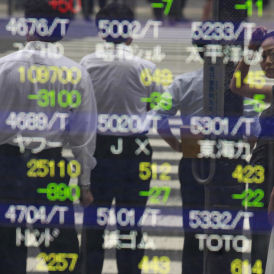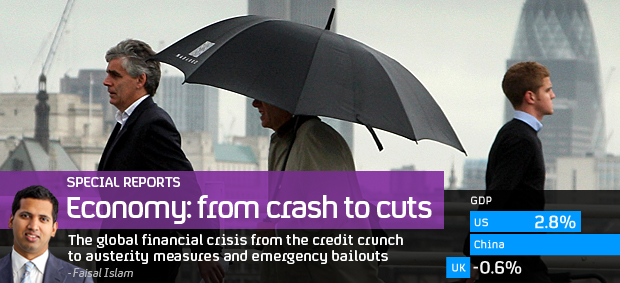Markets still falling over US and euro fears
Markets across the globe have continued to slide as investors react to the problems in the eurozone and fears about the United States economy.

The FTSE 100 index closed down 178 at 5068.9 this afternoon, down 3.39 per cent. In Germany the Dax was down 5.02 per cent, while France’s Cac 40 registered a 4.68 drop.
Many had expected the markets to crash this morning after a torrid weekend of financial news, including the downgrade of the United States AAA credit rating as well as continued fears over the eurozone.
Instead, the European markets rallied in early tradine after the European Central Bank (ECB) pledged to step in to prop up Italy and Spain. However the outlook has darkened since then, with values sliding back. The FTSE is currently down by around 2 per cent – for the latest market data, click here.
The Dow Jones industrial average in New York continued to move downwards in response to the unprecedented US downgrade.
The London market lost 10 per cent of its value last week as nearly £150bn was slashed from the value of the UK’s 100 biggest companies in its worst period of trading since October 2008. Other global markets slumped amid eurozone debt fears on top of concerns over the US economy.
G7 finance ministers also stepped in to reassure investors last night, saying the G7 would take joint action if needed in foreign exchange markets because “disorderly movements… have adverse effects for economic and financial stability”.
Read more from Economics Editor Faisal Islam on the economic 'giant game of Jenga'
‘Turbulence remains likely’
Many remain pessimistic over the prospects for the global economy, including Nouriel Roubini writing in the Financial Times.
“The misguided decision by Standard & Poor’s to downgrade the US at a time of such severe market turmoil and economic weakness only increases the chances of a double dip and even larger fiscal deficits,” he warned.
“So can we avoid another severe recession? It might simply be mission impossible.”
-
Latest news
-
Fans react to football clubs increasing season ticket prices4m

-
‘We’re still a long way from justice’, says infected blood scandal victim5m

-
Infected blood scandal: Victims set to receive billions of government compensation7m

-
Iran’s president and foreign minister missing after helicopter crash3m

-
Yungblud launches his own affordable music festival5m

-





